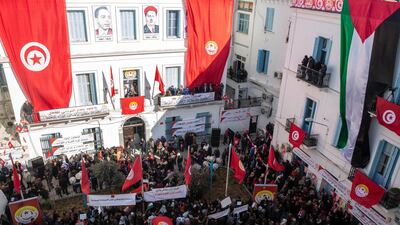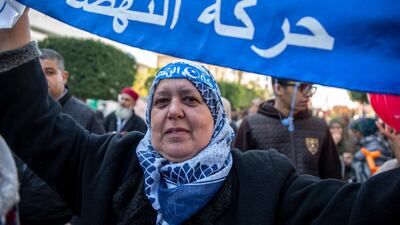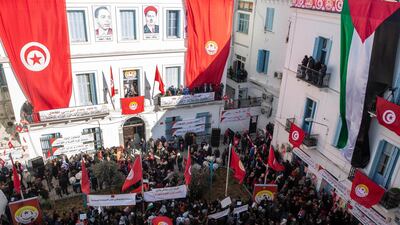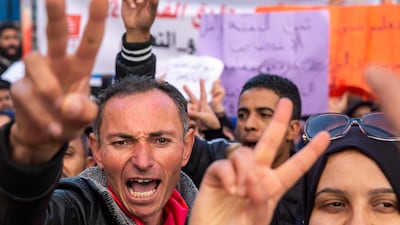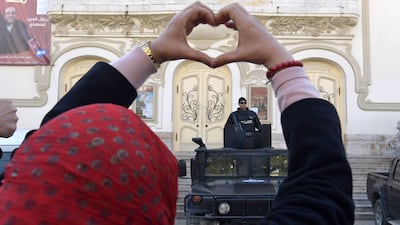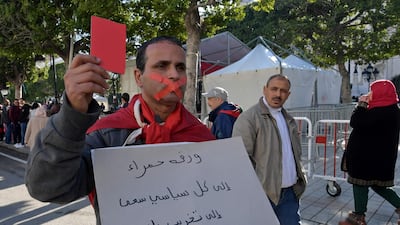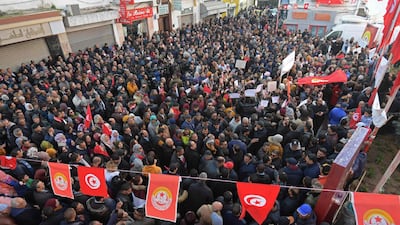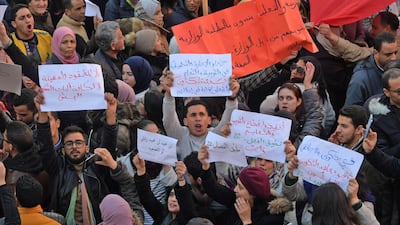Hundreds of people have rallied at the Mohamed Ali Place in central Tunis to commemorate the ninth anniversary of the uprising that sparked the Arab uprisings as parliamentarians wrangle over naming a cabinet.
Trade unionists and members of the civil society filled the square throughout the morning outside the Tunisian General Labour Union (UGTT) headquarters in a moderately festive atmosphere to celebrate some achievements but also to lament a lack of socio-economic progress.
Demonstrators’ feelings on the occasion were mixed. Some said they were hopeful, others admitted to having few expectations for the future, while many complained about the sluggish economy and lack of employment opportunity.
Protesters said nine years after the moment that sparked the uprisings, little has changed despite successive governments, elections and promises.
Participants gathered to the tune of revolutionary and patriotic songs, and chanted “work, freedom and social justice” and “Everyone has the right to work”.
One protester, with his mouth taped shut, held a placard reading “Red card for every politician who has destroyed Tunisia”.
Several banners carried critical messages such as “No to Ghannouchi’s attack to national sovereignty” and “Tunisia is a civil state, not an Ottoman region”, hinting at parliament speaker and Muslim Ennahdha party leader Rached Ghannouchi’s controversial visit to Turkey to meet its president day after the government failed to win the confidence vote last week.
Standing across from the UGTT's premises, Mongi Merzgui, secretary-general of the union at Tunisia's National Office for Sanitation (ONAS) blamed the political elite for the country's long-standing social and economic problems.
“The political class has proved to be immature and irresponsible. They only care about themselves, and never think about our country”, he said, “I’m really disappointed”.
While acknowledging that the Jasmine revolution has brought some freedoms, Mr Merzgui pointed out that people have not seen any tangible improvement in their lives.
“We have freedom of expression, but that can’t create jobs or feed us”, the trade unionist said, adding he hoped the Labour Union and civil society groups could exert pressure on the new political leadership to act responsibly.
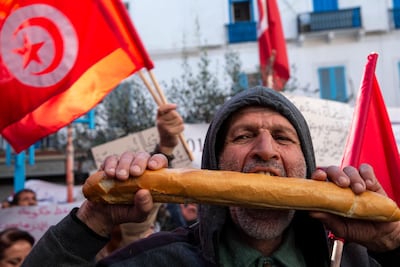
“It’s a shame that opportunism and careerism of all our politicians have played against our revolution, but we’re still optimistic”, opined Faten Ben Aamar, an active member of the civil society joined by a group of other women.
She noted that the North African country’s young democracy is marching on although it is passing through an impasse.
“It’s a revolutionary process, we’re building the path and waiting with a lot of hope”, Ben Aamar said adding that there is a common desire among Tunisians to move aside old leaders and see real change.
This year’s anniversary protest was held against the backdrop of an institutional void. The country is still without a new government nearly three months after the October election. The Tunisian parliament rejected on Friday the cabinet proposed by Prime Minister-designate Habib Jemli, prolonging the political deadlock and forcing a complex coalition-building process to restart.
President Kais Saied must appoint a new prime minister within 10 days, who then has to pull together a new government will once again need approval by a parliamentary majority. If the impasse continues, the president can call fresh elections.
While the government formation process is dragging on, the country faces urgent economic problems and needs prompt reforms to tackle issues including a meagre 1.8 per cent economic growth since 2010, 15 per cent unemployment, rampant inflation, and a large public debt.
Tunisia has been in a state of social unrest since former dictator Zine El Abidine Ben Ali's regime was overthrown in the 2011 revolution.
It is halfway through a $2.8 billion International Monetary Fund (IMF) loan programme, which started in 2016. The IMF required the government to restrain in spending, especially on subsidies and public sector wages. But spending cuts have been unpopular and fuelled further unrest.
Rallying beside a crowd of unemployed was Emna, a professor who expressed dissatisfaction at the country’s situation. “Everything has turned so expensive, we can no longer lead a dignified life”, the teacher said. But she remains hopeful the country can take a new direction.
“We’re here to say that Tunisia will stay with Tunisians, and won’t go to those who want to steal our revolution”, she added.
